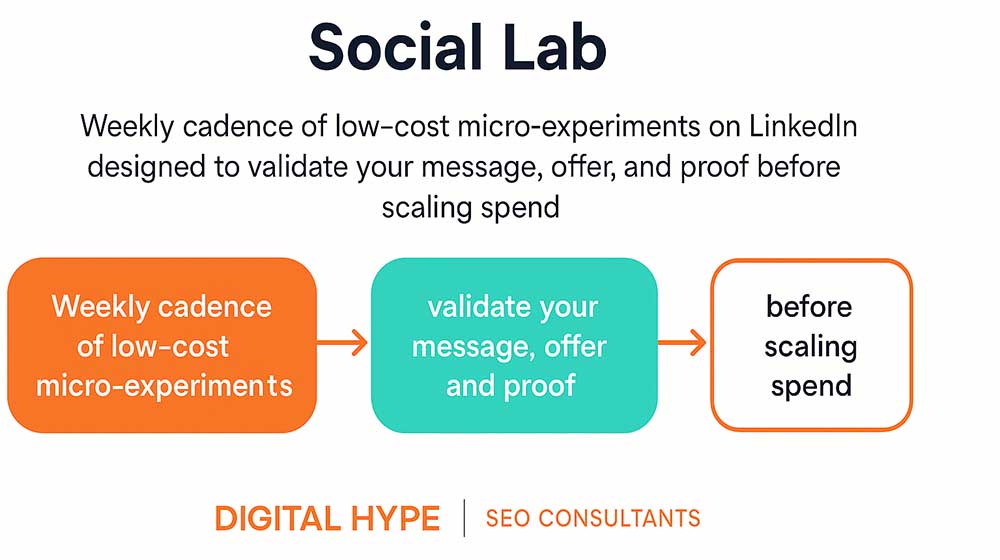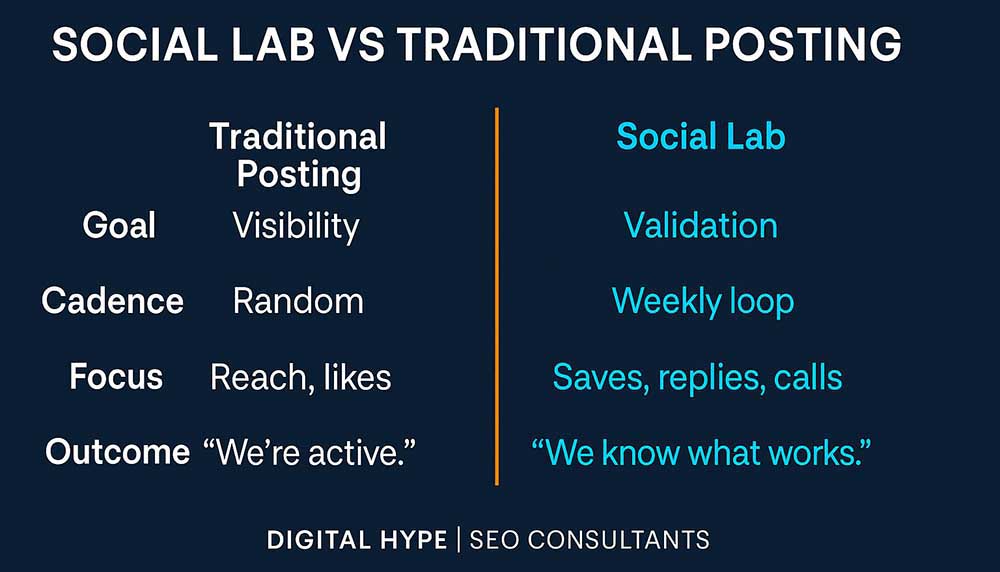Last summer a Bournemouth business owner said to me, “We’re ready to push £8,000 into LinkedIn ads.” Their diary was quiet. The offer wasn’t tested. We paused the spend and ran what I call a Social Lab for two weeks. By day ten they had a sharper hook, two objections neutralised, and three warm calls booked, before a single advertising pound was committed.
That’s the point. Most SMEs post. Few test. Testing saves you thousands later.
What I Really Mean by a “Social Lab” (Working Definition)

Social Lab = a weekly cadence of low-cost micro-experiments on LinkedIn designed to validate your message, offer, and proof before scaling spend.
It’s not “posting more.” It’s controlled experiments: one hypothesis, one format, one proof point, one objection at a time, and a retro at the end of the week so the learning compounds.
Why this matters: when you validate message–market fit (the way you describe your product or service) in-feed, your future advertising, sales calls, and landing pages start on third base. UK companies that adopt this mindset cut wasted cycles and build offers customers already believe in.
The Trap Most Firms Fall Into (And How I Learned Not To)
My early mistake: chasing impressions. It felt productive, but it never moved the pipeline. The quiet killer is vanity metrics, you celebrate the spike and miss the signal.
What most businesses overlook:
- Objection content. Almost nobody posts “the thing prospects are thinking but won’t say.” When you name it, DMs happen.
- Offer fragments. Testing a full pitch hides the winning piece. Test one benefit + one receipt at a time.
- Retros. Without a weekly retro, you’ll keep “rediscovering” the same hooks and wasting months.
Historical context: LinkedIn evolved from static CVs to a conversation engine. Formats have come and gone (remember when document posts were novel?), but one truth remains: conversational signals (saves, replies, profile clicks, booked calls) consistently outperform raw reach.
How I Run a 7-Day LinkedIn Lab (Real-World Cadence)
I’ve used this loop with sole traders, Dorset SMEs, and national firms. One week is enough to see patterns.
| Day | Action | What I’m Actually Looking For |
| 1 | Hypothesis: who + pain + promise | If I can’t say it in one sentence over coffee, it’s not ready. |
| 2 | Format test: poll vs carousel vs video | Polls often lift reach; carousels surface “saves”; video warms voice. |
| 3 | Offer fragment: 1 benefit + 1 proof | A screenshot beats a glossy PDF nine times out of ten. |
| 4 | Objection post: name the #1 blocker | Price, risk, timing — call it out, then bridge it. |
| 5 | Proof post: Before → After → Bridge | Mini case. Even anecdotal is fine if truthful and specific. |
| 6 | DM script for warm engagers | Curiosity opener: “Noticed X resonated — worth a 10-min compare-notes?” |
| 7 | Retro: keep hooks, kill weak angles | Save the exact words people used. That’s your copy gold. |
Insider note: I rotate formats even when one “wins,” because monocultures lull you into false confidence. The pattern (hook, objection, proof) matters more than the container.
The Signals I Actually Watch (And What To Do Next)
Likes are polite. These are signals of intent — and what I do when I see them:
| Signal (per post / week) | What It’s Telling You | If-This-Then-That Action |
| Profile visits ≥ 15 | Hook landed; curiosity triggered | Pin the best hook in your headline banner; ship a follow-up post that deepens that angle |
| Saves ≥ 8 | Perceived “keepable” value | Turn the post into a 5-slide carousel; add it to a future lead magnet |
| Replies/DMs ≥ 3 | Conversation gravity | Move the proof earlier in future posts; test a low-friction calendar CTA |
| Call bookings ≥ 1 | True resonance | Spin a micro-case study within 48 hours; build a retargeting audience from viewers |
| High reach, low clicks | Format inflated vanity | Repeat content in a different format; change thumbnail/hook first, not the offer |
| Low reach, high saves | Niche hit, weak distribution | Re-post at a different slot; DM the post to 5 relevant contacts with a question |
For the official take on measurement, LinkedIn’s own Measurement & Analytics guidance is worth a skim: LinkedIn Marketing Solutions — Measurement & Analytics
Turn Experiments Into Growth
Stop guessing, start validating. Our Social Media Optimisation service helps Bournemouth and UK businesses run smart LinkedIn experiments that save budget and win more calls.
Let’s TalkMid-Week Reality Check: What the Data Usually Reveals
- Hooks repeat. In every lab, two or three phrases win. Use those words everywhere: headline, banner, first line.
- Objections drive DMs. A Poole consultancy’s “Is this too expensive?” post triggered six warm threads in two days.
- Raw proof outperforms polish. A messy analytics screenshot beat a designed case study because it felt real.
Social Lab vs Traditional Posting (Why This Isn’t “More Content”)

| Traditional Posting | Social Lab | |
| Goal | Visibility | Validation |
| Cadence | Random | Weekly loop |
| Focus | Reach, likes | Saves, replies, calls |
| Outcome | “We’re active.” | “We know what works.” |
Short-term wins (reach spikes, dopamine) are fine, long-term consequences (no validated offer, burnt budget) are not. The Lab protects the future by learning in the present.
Tools That Save Hours (And Don’t Eat Your Life)
- UTM on your profile link so you can see visitors in Analytics.
- Airtable or Google Sheets to bank: hooks, objections, proof snippets, and outcomes.
- One retargeting audience only (profile viewers or site visitors) until you have a repeatable hook.
- Carousel templates to standardise design so the copy gets the attention. (If you want help, our Content Marketing team can build a set that fits your brand.)
Pro move: create a “Hook Bank” tab. When the same phrase shows up in comments, DMs, and calls, you’ve found market language. Keep it exact.
Real-World Snapshots (Quick Dorset Stories)
- Recruitment, Bournemouth. They believed “candidates don’t reply on LinkedIn.” A week of objection posts (“No, we don’t spam your CV”) plus a curiosity DM opener led to seven warm conversations without ads.
- Manufacturer, Poole. Polls drove big reach but shallow action. Carousels with Before → After → Bridge won saves and two demo requests. Lesson: reach ≠ results.
Running the Lab at £0, £100 or £500 (Service-by-Budget)
- Sole traders (£0–£100).
Use scripts, native video from your phone, a simple Sheet, and curiosity DMs. Sequence: hooks → objections → proof. - SMEs (£100–£250).
Add a basic mic + tripod; buy or commission a carousel template pack; schedule two formats per week. - Corporates (£250–£500).
Layer light retargeting (viewers/visitors) and test a low-friction CTA (audit, review). Guardrails: Don’t add advertising spend until you have two validated hooks and one proven objection response.
Bournemouth to UK-Wide: Why You Should Do This Before Ads
Because advertising pounds amplify whatever you feed them. If your message is off, ads burn cash faster. If your message is proven, ads book meetings. The Lab is pre-ad insurance, especially for UK teams stretching into national markets.
FAQ (What People Actually Ask)
1) How many weeks until this “works”?
Run four loops. By week two, you’ll see hook patterns; by week four, you’ll know which objection content triggers DMs and which proof format earns saves.
2) Do I need LinkedIn Ads to do this?
No. Organic is enough to validate. Add advertising only when you’ve got two hooks and one proof format that repeatedly perform.
3) Will I annoy my network?
Not if you frame posts as stories and problem-solving. The Lab tone is curious, not pitchy.
4) What if my sector is niche?
Great. Niche audiences telegraph a signal faster. You’ll know within a week whether the hook lands.
Fast Contrast: Social Lab vs ABM
- ABM (Account-Based Marketing) targets specific accounts with tailored outreach and content.
- Social Lab validates messages before you build the ABM assets.
Use the Lab to discover the hook and objection language; use ABM to deploy it with precision.
What To Capture (So The Learning Compounds)
- Hook phrases that keep getting saves or replies.
- Top objections (verbatim).
- Proof formats that earn DMs (screenshots, mini-cases, 30-sec videos).
Store them. They become landing page headlines, email subject lines, and advertising copy that doesn’t feel like guesswork.
Why I’ll Always Back Testing Over Posting
I’ve lost count of the firms I’ve seen mistake activity for traction. A busy feed might look impressive, but without proof it resonates, it’s just background noise. What really separates the companies that grow from the ones that stall is the discipline to test, learn, and refine before they throw money at reach.
That’s why I’m so blunt about this: posting is easy — testing is strategy. A Social Lab isn’t glamorous, but it gives you something no ad budget can buy: confidence that your message actually lands with the people you want to reach.
If you take one thing from this article, let it be this: stop guessing, start validating. It’s the fastest way to turn content into conversations and conversations into clients. And if you’d like a hand setting up your own Lab, our Social Media Optimisation approach is built exactly for that.


